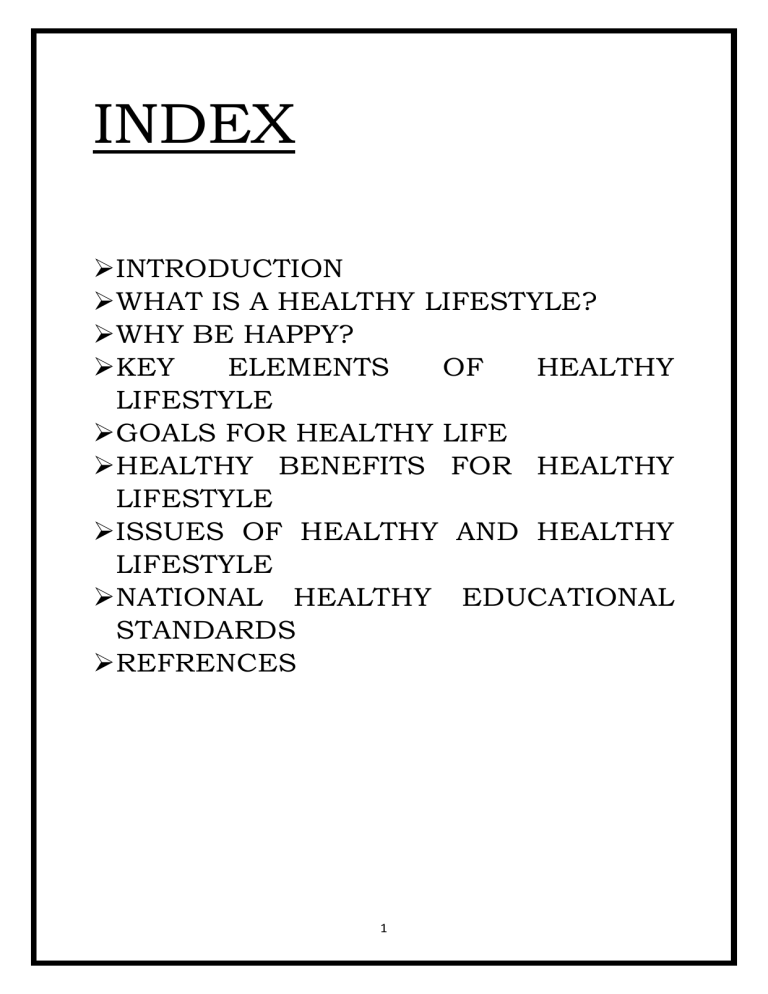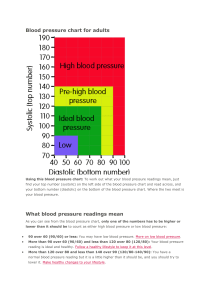
INDEX INTRODUCTION WHAT IS A HEALTHY LIFESTYLE? WHY BE HAPPY? KEY ELEMENTS OF HEALTHY LIFESTYLE GOALS FOR HEALTHY LIFE HEALTHY BENEFITS FOR HEALTHY LIFESTYLE ISSUES OF HEALTHY AND HEALTHY LIFESTYLE NATIONAL HEALTHY EDUCATIONAL STANDARDS REFRENCES 1 INTRODUCTION Health and lifestyle-related issues refer to problems or concerns that arise from the way individuals live their lives and the choices they make regarding their physical, mental, and emotional wellbeing. These issues can have a significant impact on a person's quality of life, productivity, and overall health. Some common health and lifestylerelated issues include: 1. Poor nutrition and diet-related illnesses such as obesity, diabetes, and heart disease. 2. Lack of physical activity, leading to weight gain and cardiovascular disease. 3. Substance abuse and addiction, including alcohol, tobacco, and illicit drugs. 4. Mental health issues such as anxiety, depression, and stress. 5. Sleep disorders and inadequate sleep. 2 6. Environmental factors such as pollution, noise, and exposure to hazardous substances. 7. Poor workplace ergonomics and occupational health hazards. 8. Sexual and reproductive health concerns. 9. Infectious diseases such as sexually transmitted infections, HIV/AIDS, and tuberculosis. 10. Chronic diseases such as cancer, autoimmune diseases, and neurological disorders. It is essential to adopt healthy habits and lifestyle choices to minimize the risk of developing health-related issues. 3 WHAT IS A HEALTHY LIFESTYLE A healthy lifestyle is a way of living that incorporates habits and practices that promote physical, mental, and emotional well-being. It includes making choices that support overall health and well-being, such as: 1. Regular physical activity: Engaging in regular exercise or physical activity can help reduce the risk of chronic diseases, maintain a healthy weight, and improve mental health. 2. Balanced and nutritious diet: Eating a balanced and nutritious diet that includes a variety of fruits, vegetables, whole grains, lean proteins, and healthy fats can provide the necessary nutrients for optimal health. 3. Sufficient sleep: Getting enough sleep is important for physical and mental health. Adults need between 79 hours of sleep per night. 4 4. Managing stress: Stress can have negative effects on physical and mental health, so learning to manage stress through techniques such as meditation, yoga, or mindfulness can help promote overall well-being. 5. Avoiding harmful habits: Avoiding harmful habits such as smoking, excessive alcohol consumption, and drug use can help reduce the risk of developing chronic diseases and improve overall health. 6. Maintaining social connections: Social connections and relationships are important for mental and emotional well-being. By incorporating these habits and practices into your daily routine, you can achieve a healthy lifestyle that supports your overall well-being. 5 WHY BE HEALTHY There are many reasons why it is important to maintain good health. Here are a few key reasons: 1. Improved quality of life: When you are healthy, you are able to engage in a wide range of activities without feeling limited by your physical or mental health. This can lead to a greater sense of happiness, satisfaction, and fulfilment in life. 2. Lower risk of disease: Maintaining a healthy lifestyle can reduce your risk of developing a variety of chronic diseases, such as heart disease, diabetes, and certain types of cancer. 3. Increased lifespan: People who live a healthy lifestyle tend to live longer than those who don't. This is because healthy habits such as regular exercise, a balanced diet, and avoiding smoking and excessive alcohol 6 consumption can all help to prevent premature death. 4. Improved mental health: Physical health and mental health are closely linked, and taking care of your body can have a positive impact on your mood, stress levels, and overall mental wellbeing. 5. Better productivity: When you are healthy, you are more likely to have the energy and focus needed to be productive at work or school, which can lead to greater success and fulfilment in your career and personal life. Overall, there are many compelling reasons to prioritize your health and make choices that support your wellbeing. 7 KEY ELEMENTS OF HEALTHY LIFESTYLE There are several key elements of a healthy lifestyle, including: 1. Regular Exercise: Engaging in regular physical activity is essential for maintaining good health. Exercise helps to strengthen your muscles, improve cardiovascular health, and boost your overall energy levels. 2. Balanced Diet: Eating a wellbalanced diet that includes a variety of fruits, vegetables, lean proteins, whole grains, and healthy fats is important for maintaining good health. A balanced diet can help you maintain a healthy weight, reduce your risk of chronic diseases, and improve your overall well-being. 3. Adequate Sleep: Getting enough sleep is critical for maintaining good physical and mental health. Adults generally need 7-8 hours of sleep per 8 night, while children and teenagers require more. 4. Stress Management: Finding healthy ways to manage stress, such as meditation, yoga, or spending time with loved ones, can help reduce your risk of chronic diseases and improve your mental well-being. 5. Avoiding Harmful Habits: Avoiding harmful habits such as smoking, excessive drinking, and drug use is crucial for maintaining good health. 6. Maintaining Healthy Relationships: Maintaining healthy relationships with friends, family, and loved ones is important for both mental and physical health. Social support can help reduce stress and improve overall well-being. By incorporating these key elements into your lifestyle, you can help ensure that you are living a healthy and fulfilling life. 9 GOALS FOR HEALTHY LIFESTYLE Having goals for a healthy life is important for maintaining physical, mental, and emotional well-being. Here are some goals you can consider: 1. Regular Exercise: Set a goal to engage in physical activity for at least 30 minutes every day. This could include walking, jogging, biking, or participating in a fitness class. 2. Balanced Diet: Make it a goal to consume a variety of nutritious foods, including fruits, vegetables, whole grains, lean protein, and healthy fats. Avoid processed foods, sugary drinks, and excessive amounts of alcohol. 3. Adequate Sleep: Set a goal to get 79 hours of sleep each night to allow your body to rest and recover. 4. Manage Stress: Set a goal to manage stress through practices such as meditation, deep breathing, or 10 engaging in activities that bring you joy. 5. Regular Medical check, Schedule regular appointments with your healthcare provider to ensure you are up-to-date on screenings and vaccinations, and to address any health concerns. 6. Maintain Social Connections: Make it a goal to maintain social connections with family and friends, as this can help promote overall well-being. 7. Practice Self-Care: Set aside time each day to engage in activities that promote self-care, such as taking a relaxing bath, reading a book, or practicing yoga. Remember that everyone's goals for a healthy life will look different, so it's important to focus on what works best for you and your individual needs. 11 HEALTH BENEFITS FOR HEALTHY LIFESTYLE Adopting a healthy lifestyle can bring a multitude of health benefits, some of which include: 1. Improved physical health: A healthy lifestyle can help reduce the risk of chronic diseases such as heart disease, stroke, diabetes, and some types of cancer. 2. Increased energy and vitality: Eating a healthy diet and exercising regularly can help increase energy levels, reduce fatigue, and improve overall physical function. 3. Better mental health: A healthy lifestyle can help reduce symptoms of anxiety and depression and improve overall mental health and wellbeing. 4. Stronger immune system: Eating a balanced diet and engaging in regular physical activity can help boost the immune system, making the body 12 better able to fight off infections and diseases. 5. Improved sleep: A healthy lifestyle can improve the quality of sleep, which is essential for physical and mental health. 6. Better cognitive function: A healthy lifestyle can improve cognitive function and reduce the risk of cognitive decline as we age. 7. Improved overall quality of life: A healthy lifestyle can lead to an overall improved quality of life, including increased happiness, confidence, and self-esteem. In summary, adopting a healthy lifestyle can have a significant positive impact on physical, mental, and emotional health, leading to an overall improved quality of life. 13 ISSUES OF HEALTH HEALTHY LIFESTYLE AND Issues of health and healthy lifestyle are crucial topics that impact individuals and society as a whole. Here are some key points to consider: 1. Importance of a healthy lifestyle: Living a healthy lifestyle can reduce the risk of developing chronic diseases such as heart disease, diabetes, and cancer. It can also improve mental health, quality of life, and lifespan. 2. Key elements of a healthy lifestyle: A healthy lifestyle involves regular exercise, a balanced diet, adequate sleep, stress management, and avoiding harmful things such as smoking and excessive alcohol consumption. 3. Challenges to healthy living: There are many challenges to maintaining a healthy lifestyle, including lack of time, access to healthy foods, financial barriers, and societal pressures. 14 4. Health disparities: Health disparities exist between different populations, such as those based on race, ethnicity, income, and geography. These disparities can affect access to healthcare and healthy lifestyle choices. 5. Prevention and treatment: Prevention and treatment of chronic diseases involve a combination of healthy lifestyle choices, medical interventions, and public health policies. 6. Mental health: Mental health is an important aspect of overall health and should be prioritized. Strategies such as therapy, medication, and self-care can help maintain mental well-being. 7. Environmental factors: Environmental factors, such as pollution and climate change, can have a significant impact on health and the ability to lead a healthy lifestyle. 15 Overall, maintaining a healthy lifestyle is essential for both individual and societal well-being, and addressing health issues requires a multifaceted approach involving individuals, healthcare providers, policymakers, and society as a whole. 16 NATIONAL HEALTH EDUCATIONAL STANDARDS Health Education Standards are a set of guidelines that define what students should know and be able to do in the area of health education. These standards are developed by experts in the field and are intended to provide a framework for health education curriculum and instruction across the United States. There are several sets of national health education standards, including the National Health Education Standards (NHES) developed by the Centre for Disease Control and Prevention (CDC) and the National Health Education Standards developed by the Society for Public Health Education (SOPHE). These standards typically cover a range of topics, including: 1. Health promotion and disease prevention 2. Injury prevention and safety 17 3. Nutrition and physical activity 4. Mental and emotional health 5. Substance abuse prevention 6. Family life and sexual health 7. Community health 8. and environmental Consumer health 9. Personal and social responsibility for health. 18 REFRENCES Wikipedia Chat GPT.in 19 20


